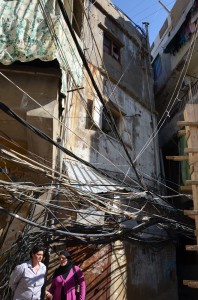Palestinians who lost both their homes and their means of earning a living during the 1948 Arab-Israeli conflict left their homeland and they, and their descendants, live in refugee camps
UNRWA
APPEH has worked closely with the United Nations Relief and Works Agency (UNWRA) responsible for Palestinian refugees. Palestinians who lost both their homes and their means of earning a living during the 1948 Arab–Israeli conflict left their homeland and they, and their descendants live in refugee camps. UNRWA has been in existence for over 65 years working in five fields: Lebanon, Syria, Jordan, West Bank and Gaza. UNRWA’s responsibilities include the provision of education, health and relief programs to Palestinian refugees and it provides virtually their only employment as teachers, nurses, social workers and the like. Whilst there is help from other agencies and NGOs, the bulk of the work falls on UNRWA’s shoulders. As the refugee population grows their resources are constantly stretched. UNRWA recently had a dramatic funding cut when the US withdrew much of its support.
More than 5 million registered Palestine refugees are living in 5 sites supported by UNRWA:
- Gaza Strip (1.2 million)
- West Bank (750,000)
- Syria (over half a million registered refugees, more than half of them displaced by the current conflict in Syria)
- Lebanon (around 455,000 living in 12 camps. 53,000 displaced refugees from Syria have registered with UNRWA in Lebanon)
- Jordan (more than 2 million – more than 10,000 Palestine refugees from Syria have sought help from UNRWA)
A little history
The Palestinians Displaced … The Nakba
The 1948 war
The establishment of Israel in 1948 on 78% of Palestine land was accompanied by the ethnic cleansing of 750,000 Palestinian Arabs, both Muslim and Christian, from the new state. The refugees fled to Lebanon, Syria, Jordan, which now included the West Bank, and the small Gaza Strip, which came under Egyptian control.
Refugees
Israel’s admission to the United Nations was contingent on the return of the refugees to their homes. This requirement has not been implemented in practice, however, and 5.3 million Palestinians are still refugees, 64 years later.
Israeli Arabs
The 160,000 Palestinians remaining in Israel after 1948 lived under martial law until 1967. Today, these ‘Israeli Arabs’ number 1.6 million, representing 20% of Israel’s population.
The 1967 war
Israel’s capture of the East Jerusalem, the West Bank and the Gaza Strip in the 1967 war brought the remaining 22% of Palestine under Israeli control, and generated a further 250,000 refugees. UN Security council Resolution 242 passed in response to the war became the cornerstone of peace efforts.
An Occupied Land
Israeli occupation and settlements …
Israel’s continuing military occupation of the West Bank (and Gaza until 2005 and thereafter besieged) has allowed Israeli colonisation to proceed unchecked. Israel has created permanent settlements for over 650,000 of its own citizens across the West Bank and around Jerusalem — in contravention of the Fourth Geneva Convention on War.
… and their consequences
Israeli settlements, together with the network of roads that connect them, have fragmented and segmented the West Bank to the extent that a future Palestinian state based on the West Bank and Gaza may no longer be possible. This will mean the end of the two-state solution as a basis for peace and Palestinian self-determination.
Effects of the Occupation
The Occupation dominates all aspects of life for Palestinians living under it. Military rule by a foreign power pursuing colonisation in the face of indigenous resistance has inevitably meant suffering and hardship for the native population:
- Palestinians are denied security in their person and property.
- Violence and intimidation by armed Israeli settlers against unarmed Palestinians is commonplace.
- Palestinian farmland continues to be seized for settlements.
- Palestinian water resources are exploited by Israel to the detriment of Arab agriculture (in the West Bank 70 litres/day per Palestinian, 300 litres per Israeli).
- Palestinians are subject to imprisonment without charge.
- 67 Palestinian mothers were forced to give birth at Israeli military checkpoints between 2000 and 2005. 36 babies died while Israeli soldiers looked on.
- Israelis have demolished 25,000 Palestinian homes since 1967; 160,000 Palestinians are now homeless.
Palestinian freedom of movement is constrained by hundreds of checkpoints, which make work, study and all activities of society and economy difficult if not impossible.

